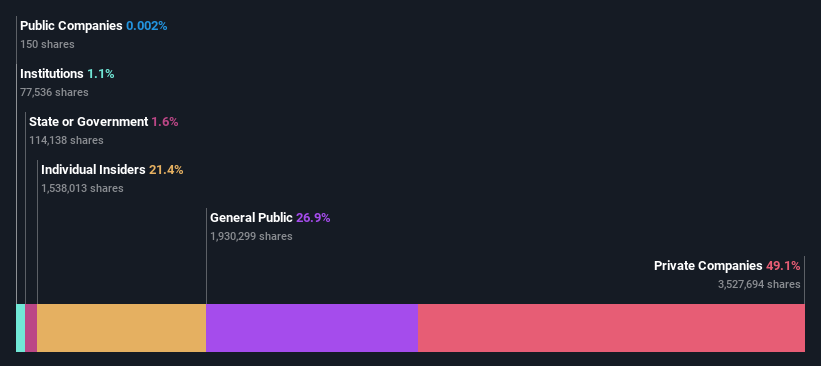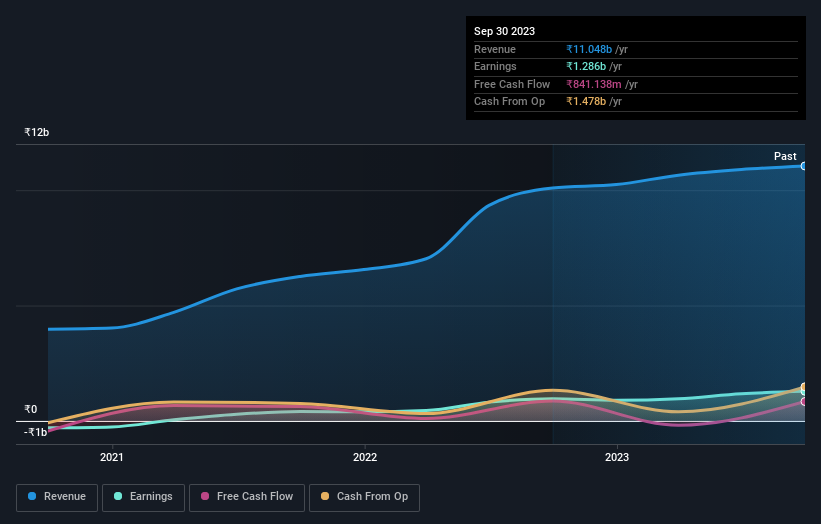Private companies are Vadilal Industries Limited's (NSE:VADILALIND) biggest owners and were rewarded after market cap rose by ₹1.7b last week

Key Insights
- Vadilal Industries' significant private companies ownership suggests that the key decisions are influenced by shareholders from the larger public
- 53% of the business is held by the top 4 shareholders
- 21% of Vadilal Industries is held by insiders
A look at the shareholders of Vadilal Industries Limited (NSE:VADILALIND) can tell us which group is most powerful. With 49% stake, private companies possess the maximum shares in the company. In other words, the group stands to gain the most (or lose the most) from their investment into the company.
As a result, private companies collectively scored the highest last week as the company hit ₹19b market cap following a 10% gain in the stock.
Let's take a closer look to see what the different types of shareholders can tell us about Vadilal Industries.
Check out our latest analysis for Vadilal Industries

What Does The Institutional Ownership Tell Us About Vadilal Industries?
Institutions typically measure themselves against a benchmark when reporting to their own investors, so they often become more enthusiastic about a stock once it's included in a major index. We would expect most companies to have some institutions on the register, especially if they are growing.
Since institutions own only a small portion of Vadilal Industries, many may not have spent much time considering the stock. But it's clear that some have; and they liked it enough to buy in. If the business gets stronger from here, we could see a situation where more institutions are keen to buy. It is not uncommon to see a big share price rise if multiple institutional investors are trying to buy into a stock at the same time. So check out the historic earnings trajectory, below, but keep in mind it's the future that counts most.

Vadilal Industries is not owned by hedge funds. Looking at our data, we can see that the largest shareholder is Vadilal International Pvt. Ltd. with 39% of shares outstanding. With 4.8% and 4.6% of the shares outstanding respectively, Devanshubhai Gandhi and Vadilal Finance Company Pvt. Ltd. are the second and third largest shareholders. Devanshubhai Gandhi, who is the second-largest shareholder, also happens to hold the title of Co-Chief Executive Officer. Furthermore, CEO Rajeshbhai Gandhi is the owner of 4.0% of the company's shares.
To make our study more interesting, we found that the top 4 shareholders control more than half of the company which implies that this group has considerable sway over the company's decision-making.
While studying institutional ownership for a company can add value to your research, it is also a good practice to research analyst recommendations to get a deeper understand of a stock's expected performance. As far as we can tell there isn't analyst coverage of the company, so it is probably flying under the radar.
Insider Ownership Of Vadilal Industries
The definition of company insiders can be subjective and does vary between jurisdictions. Our data reflects individual insiders, capturing board members at the very least. Company management run the business, but the CEO will answer to the board, even if he or she is a member of it.
I generally consider insider ownership to be a good thing. However, on some occasions it makes it more difficult for other shareholders to hold the board accountable for decisions.
It seems insiders own a significant proportion of Vadilal Industries Limited. It has a market capitalization of just ₹19b, and insiders have ₹4.0b worth of shares in their own names. We would say this shows alignment with shareholders, but it is worth noting that the company is still quite small; some insiders may have founded the business. You can click here to see if those insiders have been buying or selling.
General Public Ownership
With a 27% ownership, the general public, mostly comprising of individual investors, have some degree of sway over Vadilal Industries. This size of ownership, while considerable, may not be enough to change company policy if the decision is not in sync with other large shareholders.
Private Company Ownership
Our data indicates that Private Companies hold 49%, of the company's shares. It's hard to draw any conclusions from this fact alone, so its worth looking into who owns those private companies. Sometimes insiders or other related parties have an interest in shares in a public company through a separate private company.
Next Steps:
It's always worth thinking about the different groups who own shares in a company. But to understand Vadilal Industries better, we need to consider many other factors.
I like to dive deeper into how a company has performed in the past. You can find historic revenue and earnings in this detailed graph.
If you would prefer check out another company -- one with potentially superior financials -- then do not miss this free list of interesting companies, backed by strong financial data.
NB: Figures in this article are calculated using data from the last twelve months, which refer to the 12-month period ending on the last date of the month the financial statement is dated. This may not be consistent with full year annual report figures.
New: Manage All Your Stock Portfolios in One Place
We've created the ultimate portfolio companion for stock investors, and it's free.
• Connect an unlimited number of Portfolios and see your total in one currency
• Be alerted to new Warning Signs or Risks via email or mobile
• Track the Fair Value of your stocks
Have feedback on this article? Concerned about the content? Get in touch with us directly. Alternatively, email editorial-team (at) simplywallst.com.
This article by Simply Wall St is general in nature. We provide commentary based on historical data and analyst forecasts only using an unbiased methodology and our articles are not intended to be financial advice. It does not constitute a recommendation to buy or sell any stock, and does not take account of your objectives, or your financial situation. We aim to bring you long-term focused analysis driven by fundamental data. Note that our analysis may not factor in the latest price-sensitive company announcements or qualitative material. Simply Wall St has no position in any stocks mentioned.
About NSEI:VADILALIND
Vadilal Industries
Manufactures and sells ice-cream in India and internationally.
Flawless balance sheet with acceptable track record.
Market Insights
Community Narratives




